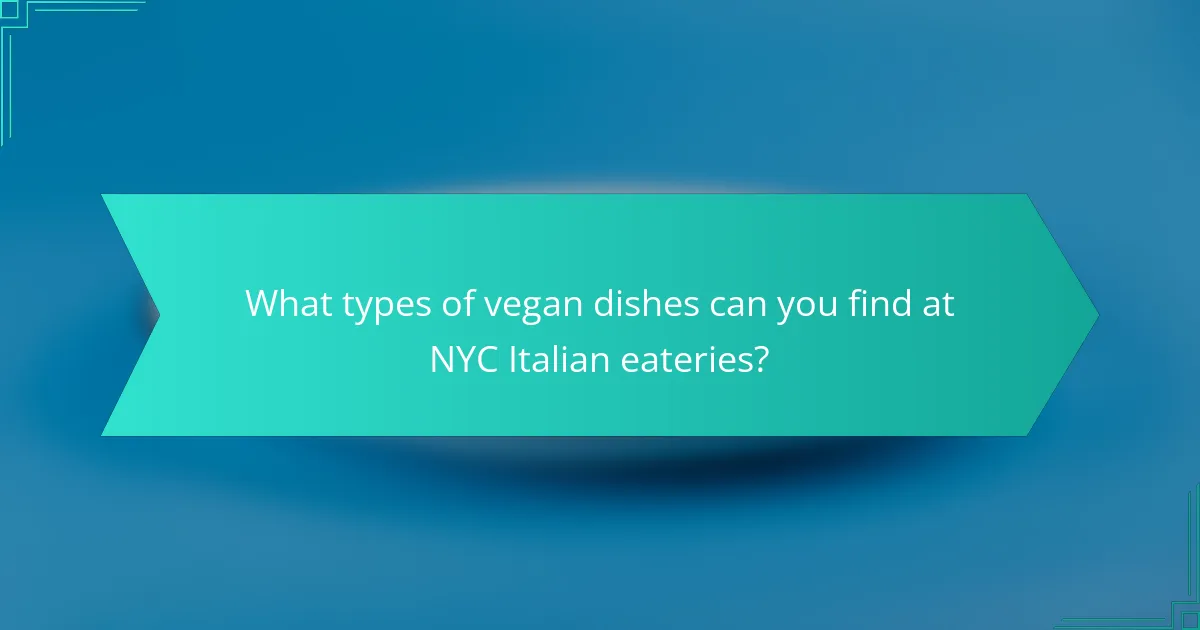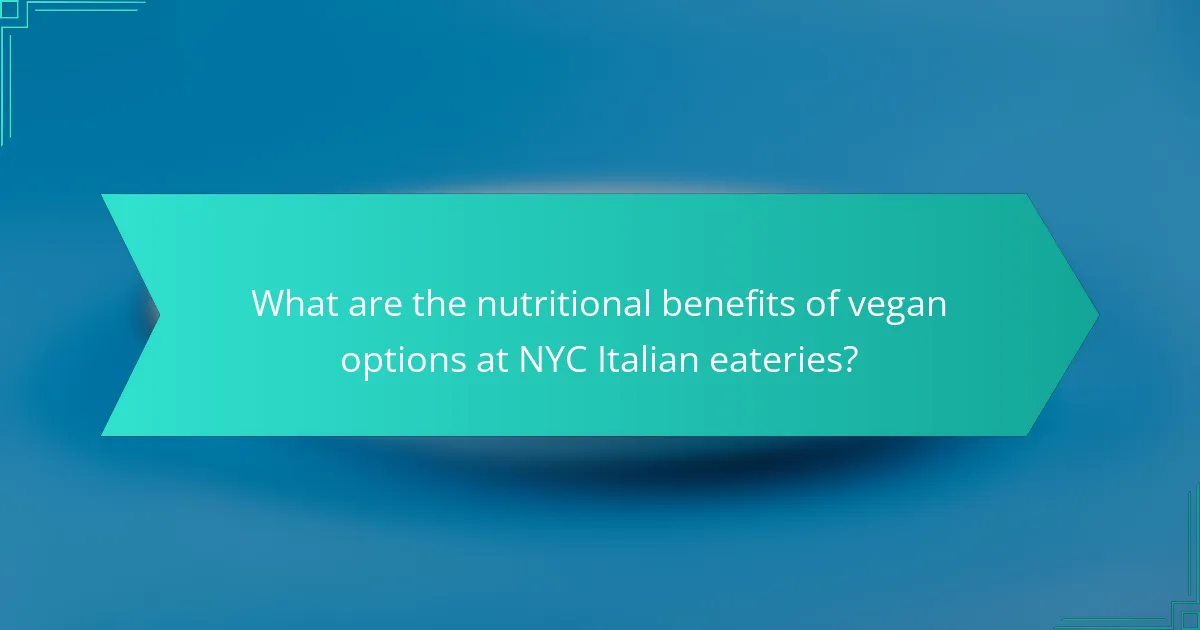Vegan options at New York City (NYC) Italian eateries encompass a diverse range of dishes, including pasta primavera, vegan pizzas, and risottos. These restaurants frequently utilize semolina or whole wheat pasta, along with plant-based proteins and vegan cheeses. Common ingredients in these dishes include seasonal vegetables, olive oil, and herbs, with many establishments offering alternatives like vegan meatballs and dairy-free sauces. Nutritionally, these vegan meals provide benefits such as lower saturated fat content, high dietary fiber, and essential vitamins and minerals, aligning with health guidelines that advocate for a diet rich in fruits and vegetables. Additionally, desserts like sorbet and vegan tiramisu contribute to the variety of vegan offerings available in NYC’s Italian dining scene.

What are Vegan Options at NYC Italian Eateries?
Vegan options at NYC Italian eateries include dishes such as pasta primavera, vegan pizzas, and risottos. Many restaurants offer pasta made from semolina or whole wheat. Vegan cheeses and plant-based proteins are often used in pizzas. Common ingredients include seasonal vegetables, olive oil, and herbs. Some eateries provide vegan meatballs or sausage alternatives. Desserts like sorbet or vegan tiramisu can also be found. A variety of sauces, such as marinara and pesto made without cheese, are available. These options cater to diverse dietary preferences while maintaining Italian culinary traditions.
How are vegan options integrated into traditional Italian cuisine?
Vegan options are integrated into traditional Italian cuisine by adapting classic recipes to exclude animal products. Common substitutes include plant-based cheeses made from nuts or soy. Pasta dishes often utilize vegetable-based sauces instead of meat or cream. Popular vegan ingredients include tomatoes, garlic, and fresh herbs. Many traditional dishes can be reimagined with vegetables as the main focus. For instance, eggplant can replace meat in dishes like lasagna. Additionally, restaurants in NYC often offer vegan versions of risotto using vegetable broth. This adaptation maintains the essence of Italian flavors while catering to vegan diets.
What common dishes are adapted to be vegan-friendly?
Common dishes adapted to be vegan-friendly include pasta, pizza, and risotto. Pasta can be made using plant-based sauces like marinara or pesto without cheese. Pizza can feature vegan cheese and a variety of vegetable toppings. Risotto can be prepared with vegetable broth and dairy-free alternatives. These adaptations maintain the essence of traditional Italian cuisine while catering to vegan diets. Many restaurants now offer these vegan options to meet the demand for plant-based meals.
How do vegan ingredients replace traditional animal products?
Vegan ingredients replace traditional animal products by mimicking their taste, texture, and nutritional profile. Common substitutes include plant-based proteins like tofu, tempeh, and legumes. These ingredients provide similar protein content found in meat. For dairy, alternatives such as almond milk, coconut yogurt, and cashew cheese replicate the flavors and textures of milk and cheese. Egg replacements like flaxseed meal and aquafaba serve as binding agents in recipes. Nutritional yeast adds a cheesy flavor without dairy. Additionally, ingredients like jackfruit and mushrooms can simulate the texture of pulled pork or beef. This versatility allows for the creation of dishes that satisfy both vegan and non-vegan diners.
Why are vegan options important in NYC Italian eateries?
Vegan options are important in NYC Italian eateries to cater to the growing demand for plant-based diets. Many consumers are adopting veganism for health, ethical, and environmental reasons. According to a 2021 survey by the Plant-Based Food Association, 27% of Americans actively seek vegan options. Offering vegan dishes allows Italian eateries to attract a broader customer base. It also promotes inclusivity for those with dietary restrictions. Additionally, vegan dishes can showcase traditional Italian flavors using innovative plant-based ingredients. This approach can enhance the restaurant’s reputation and appeal.
What trends are driving the demand for vegan options?
Health consciousness is driving the demand for vegan options. Consumers are increasingly aware of the health benefits associated with plant-based diets. Research indicates that a vegan diet can lower the risk of chronic diseases. Environmental concerns also play a significant role in this trend. Many individuals seek to reduce their carbon footprint through dietary choices. Additionally, ethical considerations regarding animal welfare contribute to the shift towards veganism. The rise of social media influences food trends, promoting vegan dishes. Lastly, the availability of diverse and innovative vegan products supports this growing demand.
How do vegan options cater to diverse dietary needs?
Vegan options cater to diverse dietary needs by providing plant-based alternatives that meet various nutritional requirements. These options are often free from common allergens like dairy and eggs. They offer high fiber content, which benefits digestive health. Many vegan dishes are rich in essential vitamins and minerals. For instance, legumes and nuts provide protein and healthy fats. Additionally, vegan options can be tailored for gluten-free diets by using alternative grains. This adaptability makes them suitable for individuals with specific dietary restrictions. Research shows that plant-based diets can lower the risk of chronic diseases, supporting health-conscious choices.

What types of vegan dishes can you find at NYC Italian eateries?
NYC Italian eateries offer a variety of vegan dishes. Common options include vegan pasta made with plant-based sauces. Dishes often feature ingredients like tomatoes, garlic, and fresh herbs. Vegan risotto is another popular choice, typically made with vegetable broth. Many restaurants serve vegan pizza topped with vegetables and dairy-free cheese. Antipasti platters may include marinated olives and roasted vegetables. Additionally, some eateries offer vegan desserts like sorbet or fruit-based options. These dishes showcase the adaptability of Italian cuisine to vegan preferences.
Which popular vegan pasta dishes are available?
Popular vegan pasta dishes include spaghetti with marinara sauce, penne arrabbiata, and vegan fettuccine Alfredo. Spaghetti with marinara features a rich tomato sauce, often enhanced with garlic and herbs. Penne arrabbiata is known for its spicy tomato sauce, made with red pepper flakes. Vegan fettuccine Alfredo substitutes dairy with cashew cream or nutritional yeast for a creamy texture. Other options include vegan pesto pasta, which uses basil, nuts, and olive oil without cheese. Vegan lasagna, layered with vegetables and plant-based cheese, is also popular. These dishes are widely available at many Italian eateries in NYC.
What ingredients are used in vegan pasta alternatives?
Vegan pasta alternatives typically use ingredients such as chickpea flour, lentil flour, brown rice flour, and quinoa flour. These flours provide a gluten-free option while maintaining a similar texture to traditional pasta. Some brands also incorporate vegetable purees, like spinach or beet, for added nutrition and color. Other common ingredients include tapioca starch and potato starch, which enhance the pasta’s elasticity. The combination of these ingredients allows for a variety of shapes and flavors in vegan pasta options.
How do these dishes maintain authentic Italian flavors?
These dishes maintain authentic Italian flavors through the use of traditional ingredients and cooking techniques. Fresh herbs like basil and oregano are commonly used to enhance flavor profiles. High-quality olive oil is a staple in many recipes, providing richness and depth. Seasonal vegetables are often incorporated, reflecting the Italian emphasis on fresh produce.
Additionally, many dishes utilize specific regional cheeses, even in vegan adaptations, to mimic traditional flavors. Cooking methods such as slow simmering or wood-fired baking are employed to develop complex tastes. The balance of acidity from tomatoes and the sweetness of roasted vegetables also contribute to authenticity.
Furthermore, many recipes are inspired by family traditions passed down through generations. This commitment to heritage ensures that the essence of Italian cuisine is preserved, even in vegan adaptations.
What vegan appetizers and sides are commonly offered?
Common vegan appetizers and sides include bruschetta, caponata, and roasted vegetables. Bruschetta features toasted bread topped with tomatoes and basil. Caponata is a Sicilian eggplant dish made with tomatoes, olives, and capers. Roasted vegetables often include seasonal produce seasoned with herbs. Other options may include vegan antipasto platters with marinated artichokes and olives. Salads with mixed greens and vinaigrette are also popular. These dishes are frequently found in NYC Italian eateries. They cater to vegan diets while maintaining traditional Italian flavors.
Which vegetables and legumes are frequently used?
Commonly used vegetables and legumes in NYC Italian eateries include tomatoes, spinach, bell peppers, and chickpeas. Tomatoes are essential for sauces and salads. Spinach is often found in pasta dishes and salads. Bell peppers add flavor and color to various dishes. Chickpeas are frequently used in salads and as protein sources. These ingredients are staples in vegan Italian cuisine, enhancing both flavor and nutrition.
How do these sides complement main dishes?
Sides complement main dishes by enhancing flavor and texture. They provide balance to the meal, offering contrasts that elevate the dining experience. For instance, a creamy risotto can be paired with a crisp salad to add freshness. Similarly, roasted vegetables can add depth to a pasta dish. The inclusion of sides can also contribute nutritional variety. For example, a side of sautéed greens can boost vitamins and minerals. Additionally, sides can introduce new culinary elements, such as herbs or spices. This variety can make the meal more enjoyable and satisfying. Overall, sides play a crucial role in creating a well-rounded dining experience.

What are the nutritional benefits of vegan options at NYC Italian eateries?
Vegan options at NYC Italian eateries offer numerous nutritional benefits. These dishes are often rich in plant-based proteins, such as legumes and nuts. They are typically lower in saturated fats compared to traditional meat-based options. Many vegan dishes contain high levels of dietary fiber, promoting digestive health.
Vegan meals often include a variety of vegetables, providing essential vitamins and minerals. For instance, tomatoes and spinach are common in Italian cuisine and are high in antioxidants. Vegan options can also be lower in calories, aiding in weight management.
According to the USDA, a diet rich in fruits and vegetables can reduce the risk of chronic diseases. This aligns with the nutritional profile of vegan dishes found in NYC Italian eateries.
How do vegan dishes compare nutritionally to traditional Italian dishes?
Vegan dishes generally have lower saturated fat and cholesterol levels compared to traditional Italian dishes. Traditional Italian cuisine often includes cheese, cream, and meats, which contribute to higher fat content. In contrast, vegan dishes utilize plant-based ingredients, resulting in a healthier fat profile. Vegan meals are typically higher in fiber due to the inclusion of whole grains, legumes, and vegetables. This can aid in digestion and promote heart health.
On the other hand, traditional Italian dishes may provide more protein from animal sources. However, vegan dishes can also be rich in protein through legumes, tofu, and seitan. Nutritionally, vegan dishes often contain more vitamins and antioxidants from a variety of fruits and vegetables. According to the USDA, a diet rich in plant-based foods can reduce the risk of chronic diseases.
In summary, vegan dishes tend to be lower in unhealthy fats and higher in fiber, vitamins, and antioxidants compared to traditional Italian dishes.
What are the health benefits of plant-based ingredients?
Plant-based ingredients provide numerous health benefits. They are rich in essential nutrients like vitamins, minerals, and antioxidants. These nutrients support overall health and help prevent chronic diseases. For instance, diets high in fruits and vegetables are linked to a reduced risk of heart disease. A study published in the Journal of the American Heart Association found that plant-based diets lower blood pressure and cholesterol levels. Additionally, plant-based ingredients can aid in weight management due to their lower calorie density. They often contain dietary fiber, which promotes digestive health and enhances satiety. Overall, incorporating plant-based ingredients into meals can lead to improved health outcomes.
How can vegan options contribute to a balanced diet?
Vegan options can contribute to a balanced diet by providing essential nutrients without animal products. They are typically rich in dietary fiber, vitamins, and minerals. For example, legumes offer protein and iron, while fruits and vegetables supply vitamins A and C. Whole grains in vegan meals provide complex carbohydrates and B vitamins. Research shows that plant-based diets can lower the risk of chronic diseases, such as heart disease and diabetes. A study published in the Journal of Nutrition found that individuals consuming plant-based diets had lower cholesterol levels. Incorporating a variety of vegan foods ensures a wide range of nutrients. This diversity can help meet daily nutritional needs effectively.
What tips can help you choose the best vegan options at NYC Italian eateries?
Research the menu in advance. Many NYC Italian eateries provide their menus online. Look for dedicated vegan sections or symbols indicating vegan options. Ask staff for recommendations on vegan dishes. They often know the best items. Explore traditional dishes that can be easily modified. Pasta dishes can often be made vegan by omitting cheese. Focus on vegetable-based appetizers like bruschetta or caponata. These typically do not contain animal products. Choose sauces like marinara or arrabbiata, which are usually vegan-friendly. Confirm ingredient lists for items like bread and desserts, as they can contain dairy or eggs.
How can you identify high-quality vegan dishes on the menu?
High-quality vegan dishes on the menu can be identified by examining ingredient freshness and sourcing. Look for dishes that feature seasonal vegetables and local produce. High-quality options often include whole foods rather than processed ingredients. Check for creative use of herbs and spices, which enhance flavor without animal products. A well-crafted vegan dish typically has a balance of protein, healthy fats, and carbohydrates. Review the cooking methods; techniques like roasting or grilling often indicate a focus on flavor. Menus that highlight chef specials or signature vegan dishes may indicate higher quality. Finally, read reviews or ask staff about popular vegan options for further insight.
What should you consider when pairing vegan dishes with beverages?
When pairing vegan dishes with beverages, consider the flavor profiles of both. Vegan dishes often feature fresh vegetables, herbs, and spices. A beverage should complement these flavors without overpowering them. For example, a light white wine can enhance the taste of a vegetable risotto. Additionally, acidity in beverages can balance the richness of vegan creams. Pairing fruity drinks with spicy dishes can also create a harmonious experience. The texture of the beverage matters too; a sparkling drink can add a refreshing contrast to hearty vegan meals. Finally, consider the overall dining experience; the beverage should enhance the meal’s enjoyment.
Vegan options at NYC Italian eateries encompass a variety of dishes such as pasta primavera, vegan pizzas, and risottos, utilizing ingredients like seasonal vegetables, plant-based proteins, and vegan cheeses. Traditional Italian recipes are adapted to exclude animal products, featuring substitutes like nut-based cheeses and vegetable-based sauces, ensuring that the essence of Italian flavors is preserved. These vegan offerings cater to the growing demand for plant-based diets, driven by health, ethical, and environmental considerations, while also providing nutritional benefits such as high fiber content and lower saturated fats. Common vegan appetizers and sides include bruschetta and roasted vegetables, enhancing the overall dining experience by complementing main dishes.